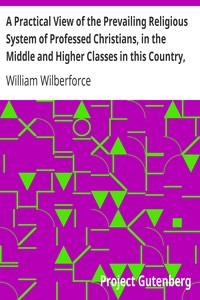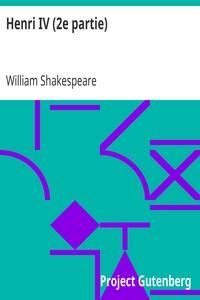|
|
Read this ebook for free! No credit card needed, absolutely nothing to pay.Words: 103021 in 18 pages
This is an ebook sharing website. You can read the uploaded ebooks for free here. No credit cards needed, nothing to pay. If you want to own a digital copy of the ebook, or want to read offline with your favorite ebook-reader, then you can choose to buy and download the ebook.

: A Practical View of the Prevailing Religious System of Professed Christians in the Middle and Higher Classes in this Country Contrasted with Real Christianity. by Wilberforce William - Christianity; Christianity Great Britain@FreeBooksWed 07 Jun, 2023 INTRODUCTION. v A PRACTICAL VIEW, &c. INADEQUATE CONCEPTIONS OF THE IMPORTANCE OF CHRISTIANITY. Before we proceed to the consideration of any particular defects in the religious system of the bulk of professed Christians, it may be proper to point out the very inadequate conception which they entertain of the importance of Christianity in general, of its peculiar nature, and superior excellence. If we listen to their conversation, virtue is praised, and vice is censured; piety is perhaps applauded, and profaneness condemned. So far all is well. But let any one, who would not be deceived, by these "barren generalities" examine a little more closely, and he will find, that not to Christianity in particular, but at best to Religion in general, perhaps to mere Morality, their homage is intended to be paid. With Christianity, as distinct from these, they are little acquainted; their views of it have been so cursory and superficial, that far from discerning its characteristic essence, they have little more than perceived those exterior circumstances which distinguish it from other forms of Religion. There are some few facts, and perhaps some leading doctrines and principles, of which they cannot be wholly ignorant; but of the consequences, and relations, and practical uses of these, they have few ideas, or none at all. Does this seem too strong? View their plan of life and their ordinary conduct; and not to speak at present of their general inattention to things of a religious nature, let us ask, wherein can we discern the points of discrimination between them and professed unbelievers? In an age wherein it is confessed and lamented that infidelity abounds, do we observe in them any remarkable care to instruct their children in the principles of the faith which they profess, and to furnish them with arguments for the defence of it? They would blush, on their child's coming out into the world, to think him defective in any branch of that knowledge, or of those accomplishments which belong to his station in life, and accordingly these are cultivated with becoming assiduity. But he is left to collect his religion as he may; the study of Christianity has formed no part of his education, and his attachment to it is, too often, not the preference of sober reason, but merely the result of early prejudice and groundless prepossession. He was born in a Christian country, of course he is a Christian; his father was a member of the church of England, so is he. When such is the hereditary religion handed down from generation to generation, it cannot surprise us to observe young men of sense and spirit beginning to doubt altogether of the truth of the system in which they have been brought up, and ready to abandon a station which they are unable to defend. Knowing Christianity chiefly in the difficulties which it contains, and in the impossibilities which are falsely imputed to it, they fall perhaps into the company of infidels; and, as might be expected, they are shaken by frivolous objections and profane cavils, which, had they been grounded and bottomed in reason and argument, would have passed by them, "as the idle wind," and scarcely have seemed worthy of serious notice. Let us beware before it be too late. No one can say into what discredit Christianity may hereby grow, at a time when the free and unrestrained intercourse, subsisting amongst the several ranks and classes of society, so much favours the general diffusion of the sentiments of the higher orders. To a similar ignorance is perhaps in no small degree to be ascribed the success, with which Christianity has been attacked of late years in a neighbouring country. Had she not been wholly unarmed for the contest, however she might have been forced from her untenable posts, and compelled to disembarrass herself from her load of incumbrances, she never could have been driven altogether out of the field by her puny assailants, with all their cavils, and gibes, and sarcasms; for in these consisted the main strength of their petty artillery. Let us beware, lest we also suffer from a like cause; nor let it be our crime and our reproach, that in schools, perhaps even in Colleges, Christianity is almost if not altogether neglected. It cannot be expected, that they who are so little attentive to this great object in the education of their children, should be more so in other parts of their conduct, where less strongly stimulated by affection, and less obviously loaded with responsibility. They are of course therefore, little regardful of the state of Christianity in their own country; and still more indifferent about communicating the light of divine truth to the nations which "still sit in darkness." But Religion, it may be replied, is not noisy and ostentatious; it is modest and private in its nature; it resides in a man's own bosom, and shuns the observation of the multitude. Be it so. From the transient and distant view then, which we have been taking of these unassuming Christians, let us approach a little nearer, and listen to the unreserved conversation of their confidential hours. Here, if any where, the interior of the heart is laid open, and we may ascertain the true principles of their regards and aversions; the scale by which they measure the good and evil of life. Here, however, you will discover few or no traces of Christianity. She scarcely finds herself a place amidst the many objects of their hopes, and fears, and joys, and sorrows. Grateful, perhaps, for health, and talents, and affluence, and other blessings belonging to their persons and conditions in life, they scarcely reckon in the number this grand distinguishing mark of the bounty of Providence; or if they mention it at all, it is noticed coldly and formally, like one of those obsolete claims to which, though but of small account in the estimate of our wealth or power, we think it as well to put in our title from considerations of family decorum or of national usage. But what more than all the rest establishes the point in question: let their conversation take a graver turn: here at length their religion, modest and retired as it is, must be expected to disclose itself; here however you will look in vain for the religion of Jesus. Their standard of right and wrong is not the standard of the gospel: they approve and condemn by a different rule; they advance principles and maintain opinions altogether opposite to the genius and character of Christianity. You would fancy yourself rather amongst the followers of the old philosophy; nor is it easy to guess how any one could satisfy himself to the contrary, unless, by mentioning the name of some acknowledged heretic, he should afford them an occasion of demonstrating their zeal for the religion of their country. The truth is, their opinions on these subjects are not formed from the perusal of the word of God. The Bible lies on the shelf unopened; and they would be wholly ignorant of its contents, except for what they hear occasionally at church, or for the faint traces which their memories may still retain of the lessons of their earliest infancy. It were almost a waste of time to multiply arguments in order to prove how criminal the voluntary ignorance, of which we have been speaking, must appear in the sight of God. It must be confessed by all who believe that we are accountable creatures, and to such only the writer is addressing himself, that we shall have to answer hereafter to the Almighty for all the means and occasions we have here enjoyed of improving ourselves, or of promoting the happiness of others. And if, when summoned to give an account of our stewardship, we shall be called upon to answer for the use which we have made of our bodily organs, and of the means of relieving the wants and necessities of our fellow creatures; how much more for the exercise of the nobler and more exalted faculties of our nature, of invention, and judgment, and memory; and for our employment of all the instruments and opportunities of diligent application, and serious reflection, and honest decision. And to what subject might we in all reason be expected to apply more earnestly, than to that wherein our eternal interests are at issue? When God has of his goodness vouchsafed to grant us such abundant means of instruction in that which we are most concerned to know, how great must be the guilt, and how aweful the punishment of voluntary ignorance! Free books android app tbrJar TBR JAR Read Free books online gutenberg More posts by @FreeBooks
: The Hero of Ticonderoga; or Ethan Allen and His Green Mountain Boys by De Morgan John - United States History Revolution 1775-1783 Juvenile fiction; Allen Ethan 1738-1789 Juvenile fiction@FreeBooksWed 07 Jun, 2023

: Titus Andronicus by Shakespeare William Guizot Fran Ois Translator - Tragedies; Andronicus Titus (Legendary character) Drama; Goths Drama; Generals Drama; Rome History Germanic invasions 3rd-6th centuries Drama; Historical drama FR Théâtre@FreeBooksWed 07 Jun, 2023
|
Terms of Use Stock Market News! © gutenberg.org.in2025 All Rights reserved.






